Contemporary Issues in Accounting: Research Proposal, ACC320, 2018
VerifiedAdded on 2023/06/04
|10
|2302
|213
Report
AI Summary
This research proposal investigates the relationship between corporate governance, stakeholder interests, and sustainability reporting. The study examines whether corporate governance should prioritize stakeholder interests over shareholders, the increasing provision of sustainability reporting, and accountants' beliefs regarding sustainability reporting. The proposal includes an introduction defining the issue, theoretical and practical motivations, and a literature review of relevant theories such as voluntary disclosure theory. The research aims to contribute to existing literature by exploring the interrelationships between corporate governance, stakeholder concerns, and sustainability reporting, and assesses whether the provision for sustainability reporting has increased. The proposal also formulates hypotheses based on agency theory and voluntary disclosure theory, exploring the impact of corporate governance on sustainability reporting and accountants' beliefs, and provides a table of appendix with key performance indicators.
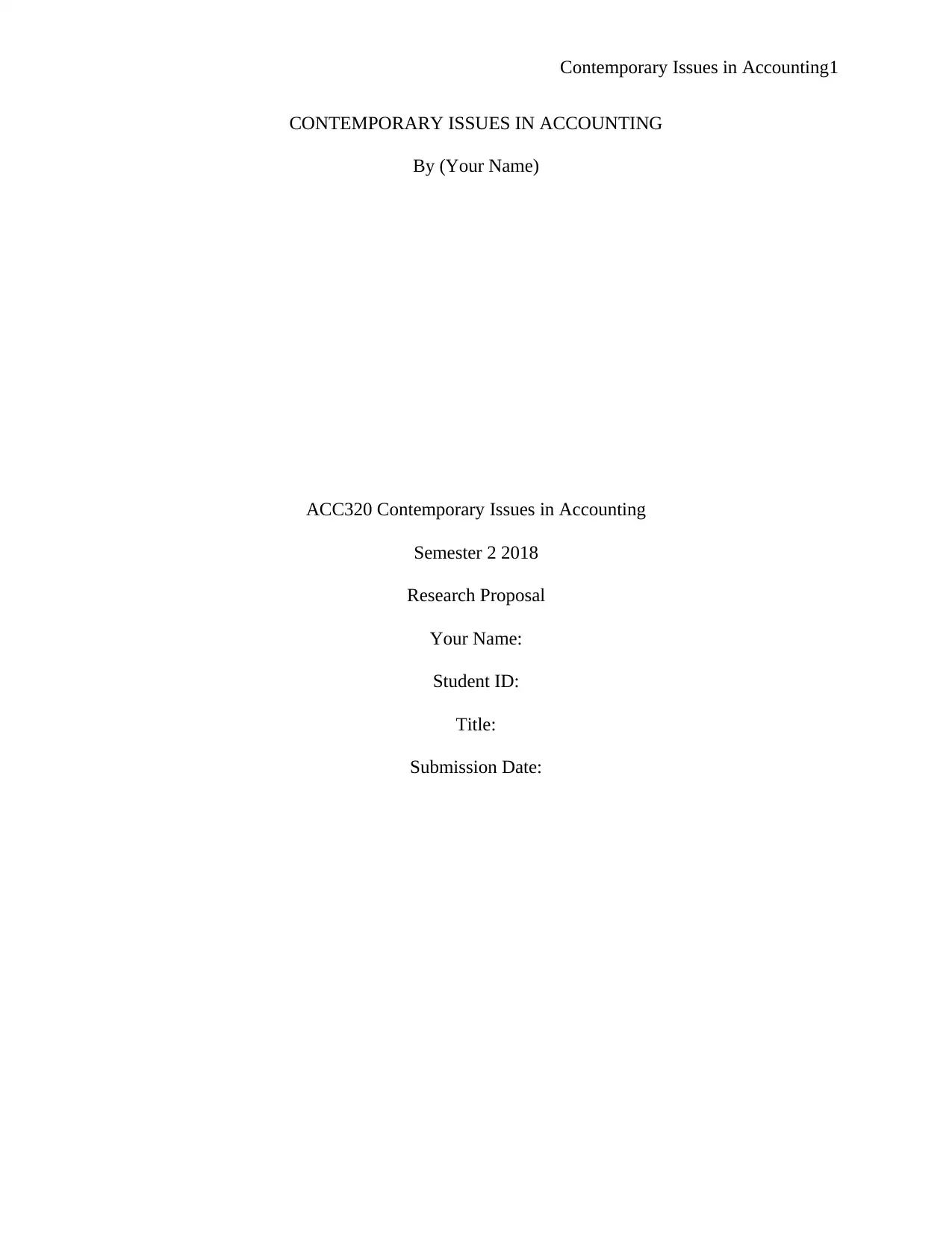
Contemporary Issues in Accounting1
CONTEMPORARY ISSUES IN ACCOUNTING
By (Your Name)
ACC320 Contemporary Issues in Accounting
Semester 2 2018
Research Proposal
Your Name:
Student ID:
Title:
Submission Date:
CONTEMPORARY ISSUES IN ACCOUNTING
By (Your Name)
ACC320 Contemporary Issues in Accounting
Semester 2 2018
Research Proposal
Your Name:
Student ID:
Title:
Submission Date:
Paraphrase This Document
Need a fresh take? Get an instant paraphrase of this document with our AI Paraphraser
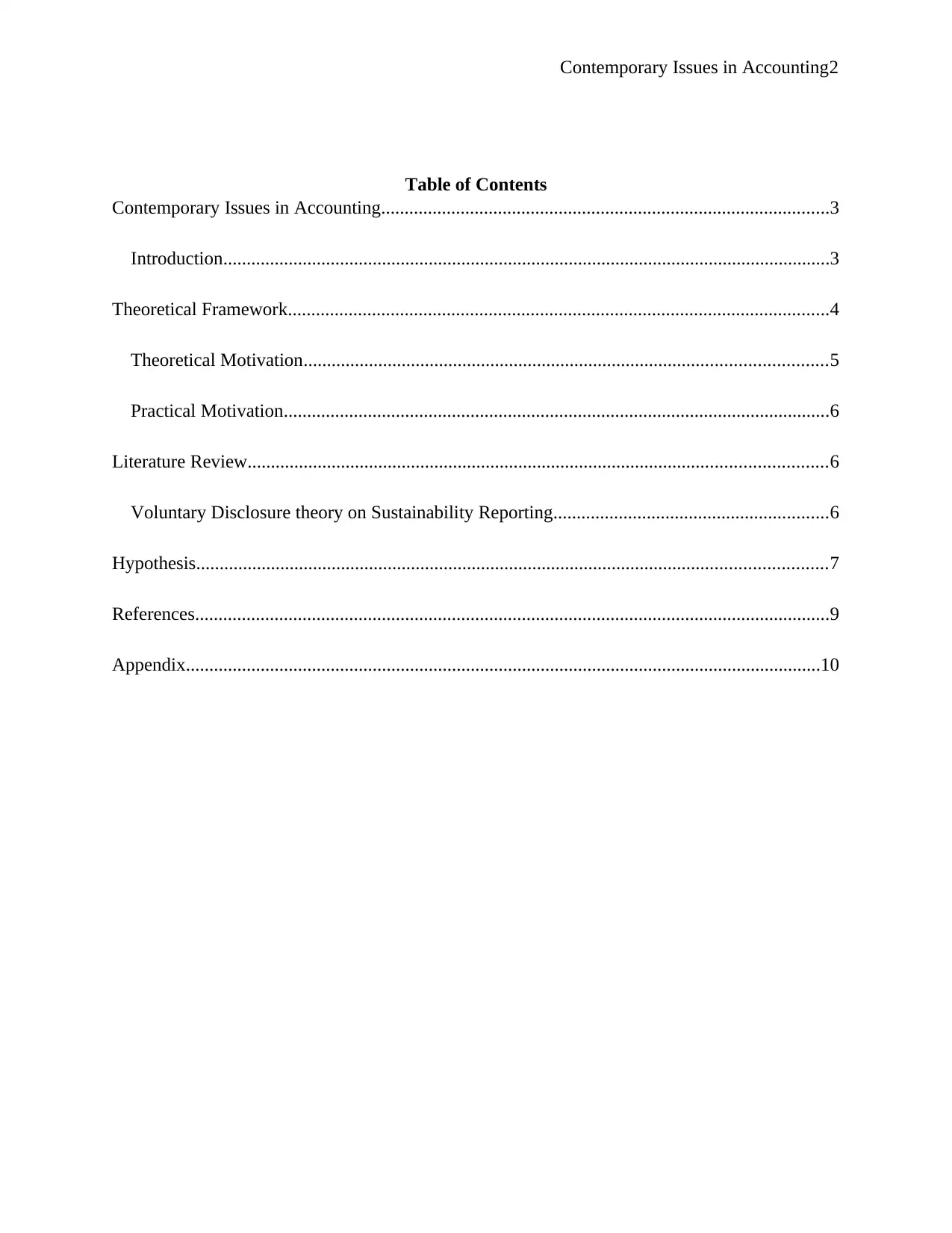
Contemporary Issues in Accounting2
Table of Contents
Contemporary Issues in Accounting................................................................................................3
Introduction..................................................................................................................................3
Theoretical Framework....................................................................................................................4
Theoretical Motivation................................................................................................................5
Practical Motivation.....................................................................................................................6
Literature Review............................................................................................................................6
Voluntary Disclosure theory on Sustainability Reporting...........................................................6
Hypothesis.......................................................................................................................................7
References........................................................................................................................................9
Appendix........................................................................................................................................10
Table of Contents
Contemporary Issues in Accounting................................................................................................3
Introduction..................................................................................................................................3
Theoretical Framework....................................................................................................................4
Theoretical Motivation................................................................................................................5
Practical Motivation.....................................................................................................................6
Literature Review............................................................................................................................6
Voluntary Disclosure theory on Sustainability Reporting...........................................................6
Hypothesis.......................................................................................................................................7
References........................................................................................................................................9
Appendix........................................................................................................................................10
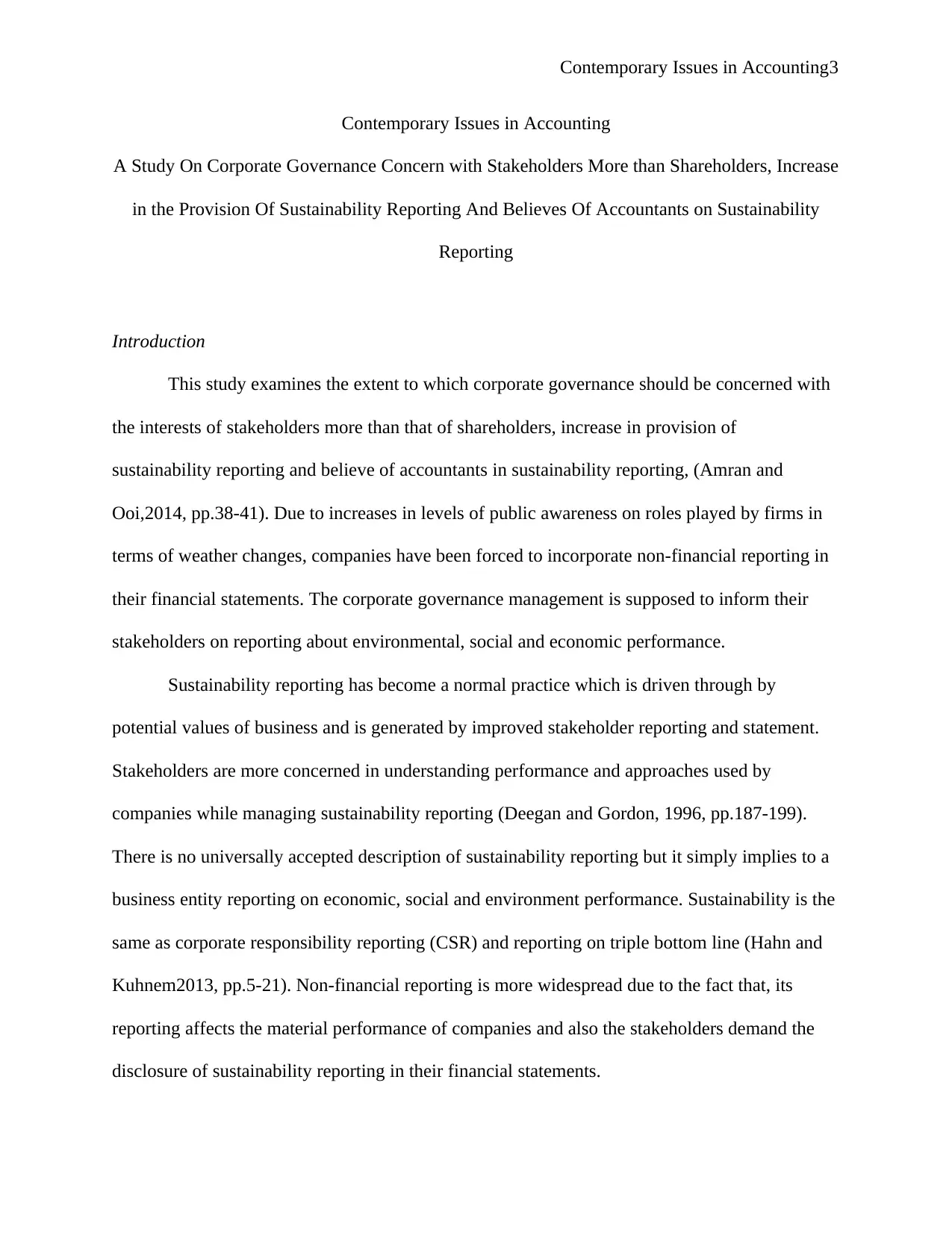
Contemporary Issues in Accounting3
Contemporary Issues in Accounting
A Study On Corporate Governance Concern with Stakeholders More than Shareholders, Increase
in the Provision Of Sustainability Reporting And Believes Of Accountants on Sustainability
Reporting
Introduction
This study examines the extent to which corporate governance should be concerned with
the interests of stakeholders more than that of shareholders, increase in provision of
sustainability reporting and believe of accountants in sustainability reporting, (Amran and
Ooi,2014, pp.38-41). Due to increases in levels of public awareness on roles played by firms in
terms of weather changes, companies have been forced to incorporate non-financial reporting in
their financial statements. The corporate governance management is supposed to inform their
stakeholders on reporting about environmental, social and economic performance.
Sustainability reporting has become a normal practice which is driven through by
potential values of business and is generated by improved stakeholder reporting and statement.
Stakeholders are more concerned in understanding performance and approaches used by
companies while managing sustainability reporting (Deegan and Gordon, 1996, pp.187-199).
There is no universally accepted description of sustainability reporting but it simply implies to a
business entity reporting on economic, social and environment performance. Sustainability is the
same as corporate responsibility reporting (CSR) and reporting on triple bottom line (Hahn and
Kuhnem2013, pp.5-21). Non-financial reporting is more widespread due to the fact that, its
reporting affects the material performance of companies and also the stakeholders demand the
disclosure of sustainability reporting in their financial statements.
Contemporary Issues in Accounting
A Study On Corporate Governance Concern with Stakeholders More than Shareholders, Increase
in the Provision Of Sustainability Reporting And Believes Of Accountants on Sustainability
Reporting
Introduction
This study examines the extent to which corporate governance should be concerned with
the interests of stakeholders more than that of shareholders, increase in provision of
sustainability reporting and believe of accountants in sustainability reporting, (Amran and
Ooi,2014, pp.38-41). Due to increases in levels of public awareness on roles played by firms in
terms of weather changes, companies have been forced to incorporate non-financial reporting in
their financial statements. The corporate governance management is supposed to inform their
stakeholders on reporting about environmental, social and economic performance.
Sustainability reporting has become a normal practice which is driven through by
potential values of business and is generated by improved stakeholder reporting and statement.
Stakeholders are more concerned in understanding performance and approaches used by
companies while managing sustainability reporting (Deegan and Gordon, 1996, pp.187-199).
There is no universally accepted description of sustainability reporting but it simply implies to a
business entity reporting on economic, social and environment performance. Sustainability is the
same as corporate responsibility reporting (CSR) and reporting on triple bottom line (Hahn and
Kuhnem2013, pp.5-21). Non-financial reporting is more widespread due to the fact that, its
reporting affects the material performance of companies and also the stakeholders demand the
disclosure of sustainability reporting in their financial statements.
⊘ This is a preview!⊘
Do you want full access?
Subscribe today to unlock all pages.

Trusted by 1+ million students worldwide
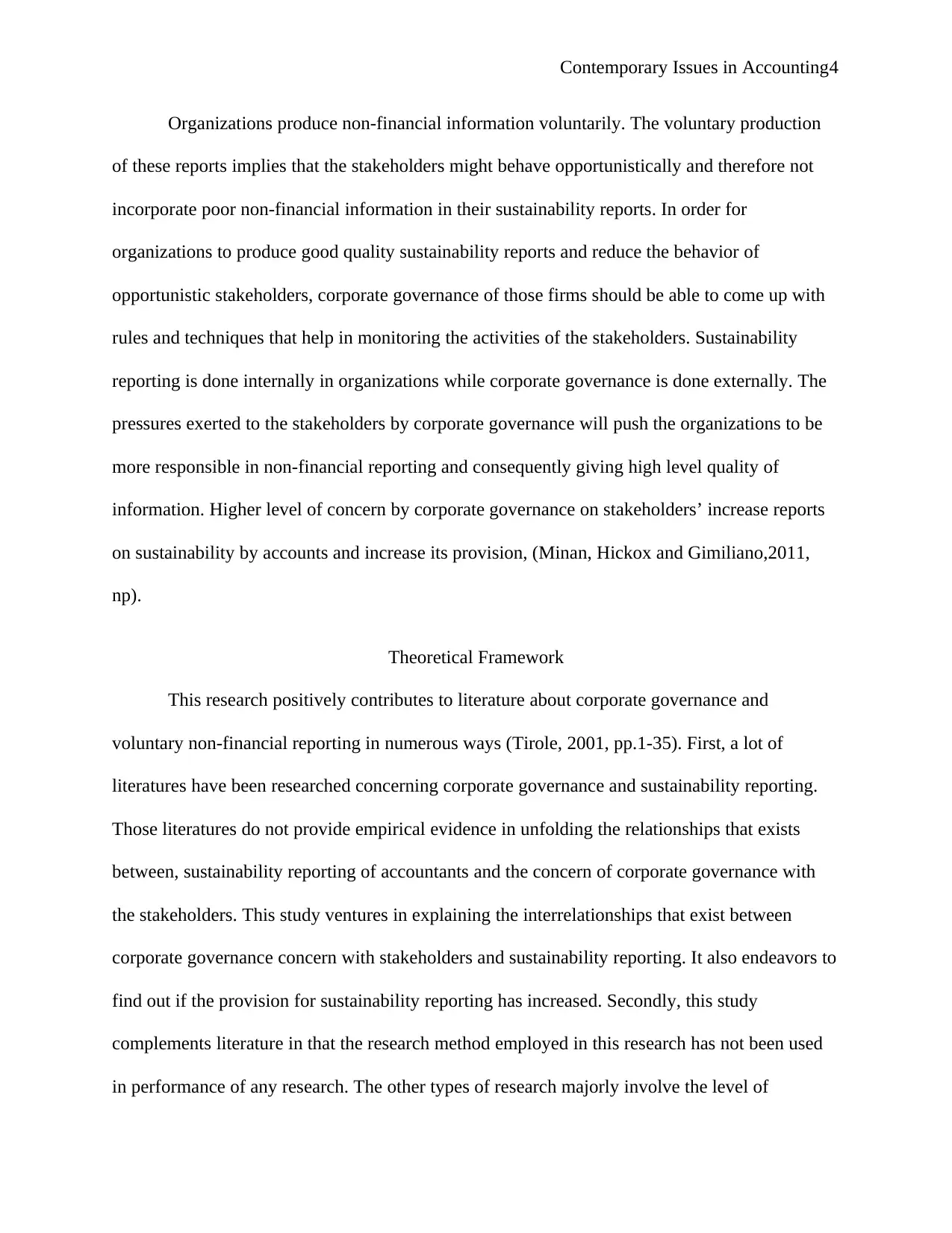
Contemporary Issues in Accounting4
Organizations produce non-financial information voluntarily. The voluntary production
of these reports implies that the stakeholders might behave opportunistically and therefore not
incorporate poor non-financial information in their sustainability reports. In order for
organizations to produce good quality sustainability reports and reduce the behavior of
opportunistic stakeholders, corporate governance of those firms should be able to come up with
rules and techniques that help in monitoring the activities of the stakeholders. Sustainability
reporting is done internally in organizations while corporate governance is done externally. The
pressures exerted to the stakeholders by corporate governance will push the organizations to be
more responsible in non-financial reporting and consequently giving high level quality of
information. Higher level of concern by corporate governance on stakeholders’ increase reports
on sustainability by accounts and increase its provision, (Minan, Hickox and Gimiliano,2011,
np).
Theoretical Framework
This research positively contributes to literature about corporate governance and
voluntary non-financial reporting in numerous ways (Tirole, 2001, pp.1-35). First, a lot of
literatures have been researched concerning corporate governance and sustainability reporting.
Those literatures do not provide empirical evidence in unfolding the relationships that exists
between, sustainability reporting of accountants and the concern of corporate governance with
the stakeholders. This study ventures in explaining the interrelationships that exist between
corporate governance concern with stakeholders and sustainability reporting. It also endeavors to
find out if the provision for sustainability reporting has increased. Secondly, this study
complements literature in that the research method employed in this research has not been used
in performance of any research. The other types of research majorly involve the level of
Organizations produce non-financial information voluntarily. The voluntary production
of these reports implies that the stakeholders might behave opportunistically and therefore not
incorporate poor non-financial information in their sustainability reports. In order for
organizations to produce good quality sustainability reports and reduce the behavior of
opportunistic stakeholders, corporate governance of those firms should be able to come up with
rules and techniques that help in monitoring the activities of the stakeholders. Sustainability
reporting is done internally in organizations while corporate governance is done externally. The
pressures exerted to the stakeholders by corporate governance will push the organizations to be
more responsible in non-financial reporting and consequently giving high level quality of
information. Higher level of concern by corporate governance on stakeholders’ increase reports
on sustainability by accounts and increase its provision, (Minan, Hickox and Gimiliano,2011,
np).
Theoretical Framework
This research positively contributes to literature about corporate governance and
voluntary non-financial reporting in numerous ways (Tirole, 2001, pp.1-35). First, a lot of
literatures have been researched concerning corporate governance and sustainability reporting.
Those literatures do not provide empirical evidence in unfolding the relationships that exists
between, sustainability reporting of accountants and the concern of corporate governance with
the stakeholders. This study ventures in explaining the interrelationships that exist between
corporate governance concern with stakeholders and sustainability reporting. It also endeavors to
find out if the provision for sustainability reporting has increased. Secondly, this study
complements literature in that the research method employed in this research has not been used
in performance of any research. The other types of research majorly involve the level of
Paraphrase This Document
Need a fresh take? Get an instant paraphrase of this document with our AI Paraphraser
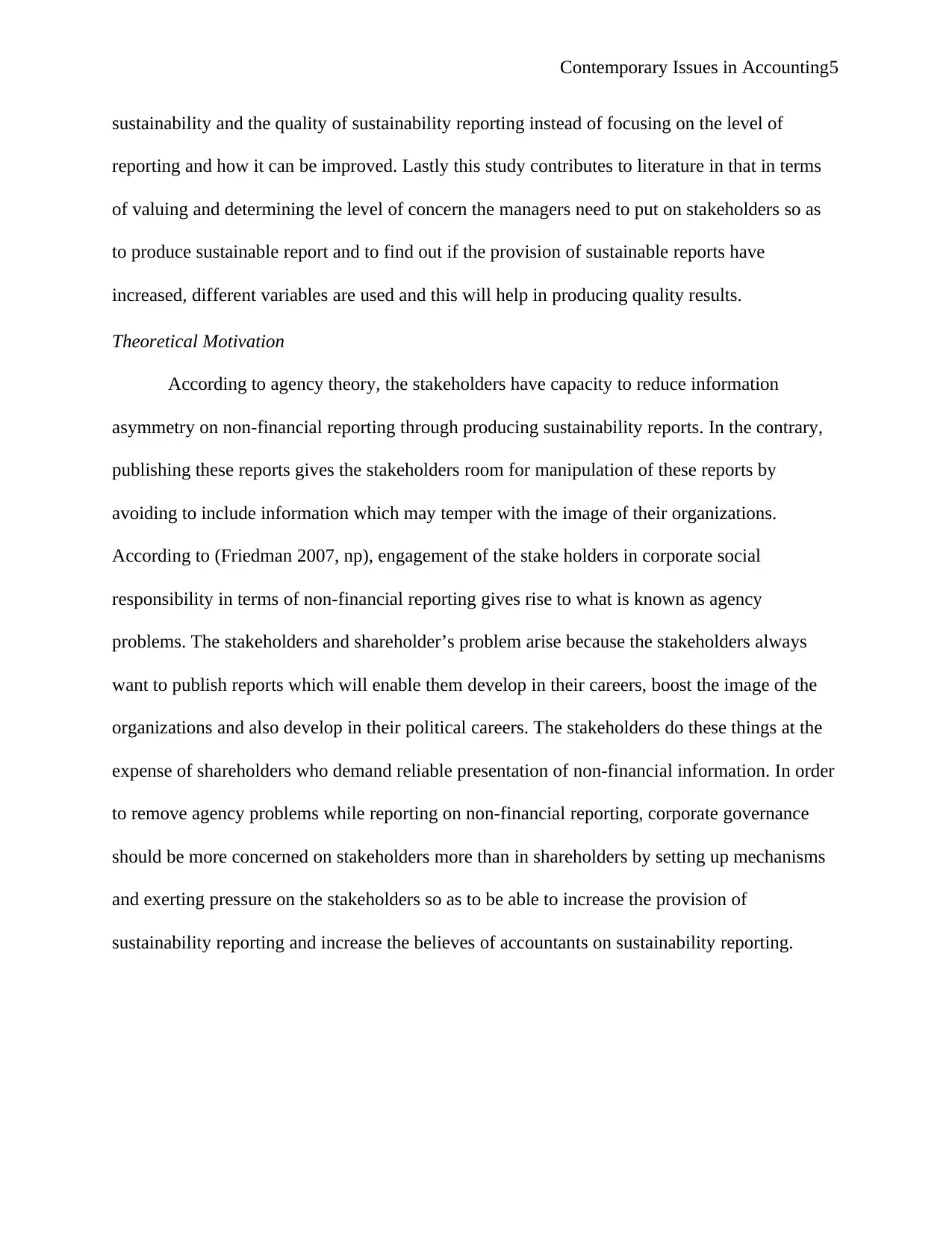
Contemporary Issues in Accounting5
sustainability and the quality of sustainability reporting instead of focusing on the level of
reporting and how it can be improved. Lastly this study contributes to literature in that in terms
of valuing and determining the level of concern the managers need to put on stakeholders so as
to produce sustainable report and to find out if the provision of sustainable reports have
increased, different variables are used and this will help in producing quality results.
Theoretical Motivation
According to agency theory, the stakeholders have capacity to reduce information
asymmetry on non-financial reporting through producing sustainability reports. In the contrary,
publishing these reports gives the stakeholders room for manipulation of these reports by
avoiding to include information which may temper with the image of their organizations.
According to (Friedman 2007, np), engagement of the stake holders in corporate social
responsibility in terms of non-financial reporting gives rise to what is known as agency
problems. The stakeholders and shareholder’s problem arise because the stakeholders always
want to publish reports which will enable them develop in their careers, boost the image of the
organizations and also develop in their political careers. The stakeholders do these things at the
expense of shareholders who demand reliable presentation of non-financial information. In order
to remove agency problems while reporting on non-financial reporting, corporate governance
should be more concerned on stakeholders more than in shareholders by setting up mechanisms
and exerting pressure on the stakeholders so as to be able to increase the provision of
sustainability reporting and increase the believes of accountants on sustainability reporting.
sustainability and the quality of sustainability reporting instead of focusing on the level of
reporting and how it can be improved. Lastly this study contributes to literature in that in terms
of valuing and determining the level of concern the managers need to put on stakeholders so as
to produce sustainable report and to find out if the provision of sustainable reports have
increased, different variables are used and this will help in producing quality results.
Theoretical Motivation
According to agency theory, the stakeholders have capacity to reduce information
asymmetry on non-financial reporting through producing sustainability reports. In the contrary,
publishing these reports gives the stakeholders room for manipulation of these reports by
avoiding to include information which may temper with the image of their organizations.
According to (Friedman 2007, np), engagement of the stake holders in corporate social
responsibility in terms of non-financial reporting gives rise to what is known as agency
problems. The stakeholders and shareholder’s problem arise because the stakeholders always
want to publish reports which will enable them develop in their careers, boost the image of the
organizations and also develop in their political careers. The stakeholders do these things at the
expense of shareholders who demand reliable presentation of non-financial information. In order
to remove agency problems while reporting on non-financial reporting, corporate governance
should be more concerned on stakeholders more than in shareholders by setting up mechanisms
and exerting pressure on the stakeholders so as to be able to increase the provision of
sustainability reporting and increase the believes of accountants on sustainability reporting.
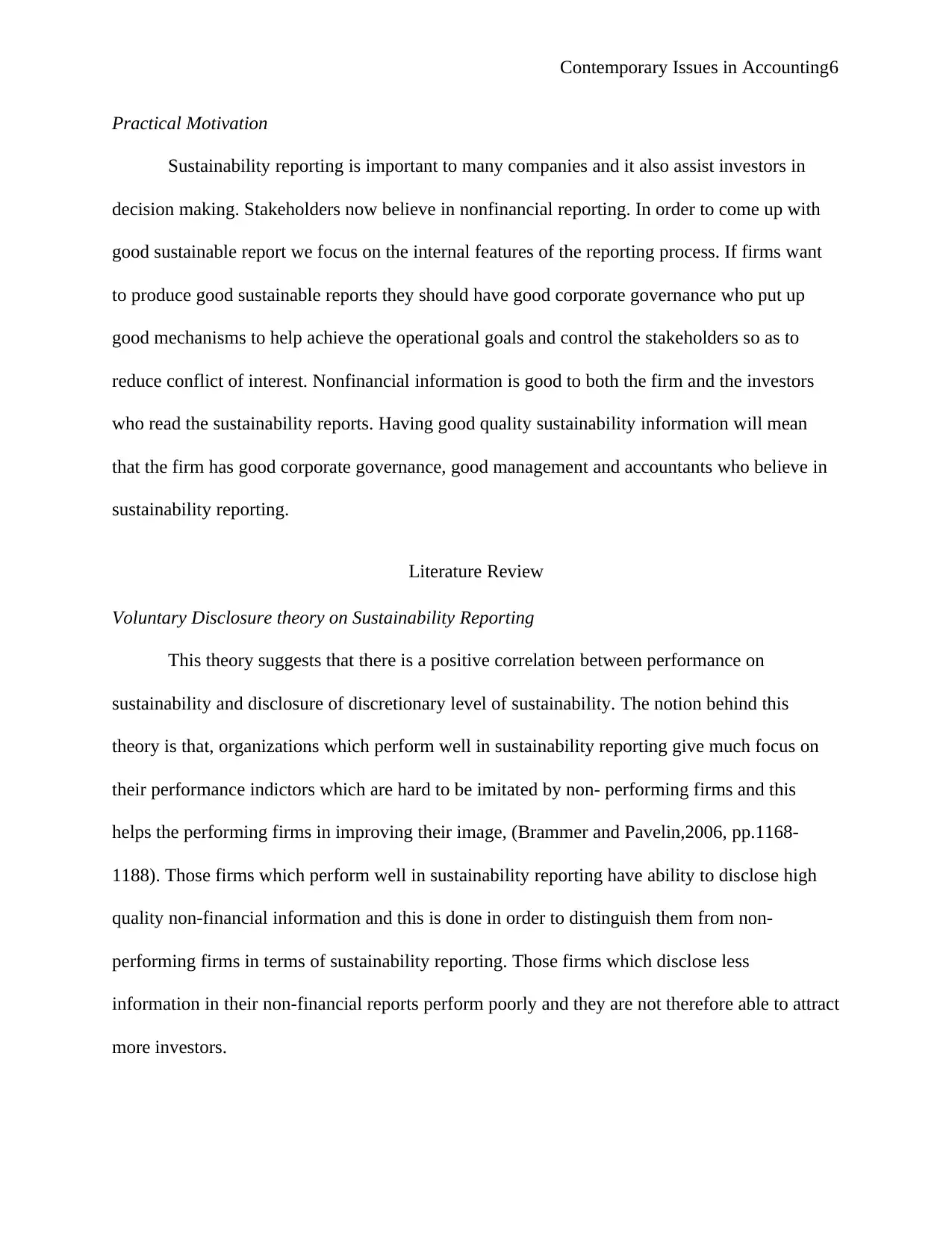
Contemporary Issues in Accounting6
Practical Motivation
Sustainability reporting is important to many companies and it also assist investors in
decision making. Stakeholders now believe in nonfinancial reporting. In order to come up with
good sustainable report we focus on the internal features of the reporting process. If firms want
to produce good sustainable reports they should have good corporate governance who put up
good mechanisms to help achieve the operational goals and control the stakeholders so as to
reduce conflict of interest. Nonfinancial information is good to both the firm and the investors
who read the sustainability reports. Having good quality sustainability information will mean
that the firm has good corporate governance, good management and accountants who believe in
sustainability reporting.
Literature Review
Voluntary Disclosure theory on Sustainability Reporting
This theory suggests that there is a positive correlation between performance on
sustainability and disclosure of discretionary level of sustainability. The notion behind this
theory is that, organizations which perform well in sustainability reporting give much focus on
their performance indictors which are hard to be imitated by non- performing firms and this
helps the performing firms in improving their image, (Brammer and Pavelin,2006, pp.1168-
1188). Those firms which perform well in sustainability reporting have ability to disclose high
quality non-financial information and this is done in order to distinguish them from non-
performing firms in terms of sustainability reporting. Those firms which disclose less
information in their non-financial reports perform poorly and they are not therefore able to attract
more investors.
Practical Motivation
Sustainability reporting is important to many companies and it also assist investors in
decision making. Stakeholders now believe in nonfinancial reporting. In order to come up with
good sustainable report we focus on the internal features of the reporting process. If firms want
to produce good sustainable reports they should have good corporate governance who put up
good mechanisms to help achieve the operational goals and control the stakeholders so as to
reduce conflict of interest. Nonfinancial information is good to both the firm and the investors
who read the sustainability reports. Having good quality sustainability information will mean
that the firm has good corporate governance, good management and accountants who believe in
sustainability reporting.
Literature Review
Voluntary Disclosure theory on Sustainability Reporting
This theory suggests that there is a positive correlation between performance on
sustainability and disclosure of discretionary level of sustainability. The notion behind this
theory is that, organizations which perform well in sustainability reporting give much focus on
their performance indictors which are hard to be imitated by non- performing firms and this
helps the performing firms in improving their image, (Brammer and Pavelin,2006, pp.1168-
1188). Those firms which perform well in sustainability reporting have ability to disclose high
quality non-financial information and this is done in order to distinguish them from non-
performing firms in terms of sustainability reporting. Those firms which disclose less
information in their non-financial reports perform poorly and they are not therefore able to attract
more investors.
⊘ This is a preview!⊘
Do you want full access?
Subscribe today to unlock all pages.

Trusted by 1+ million students worldwide
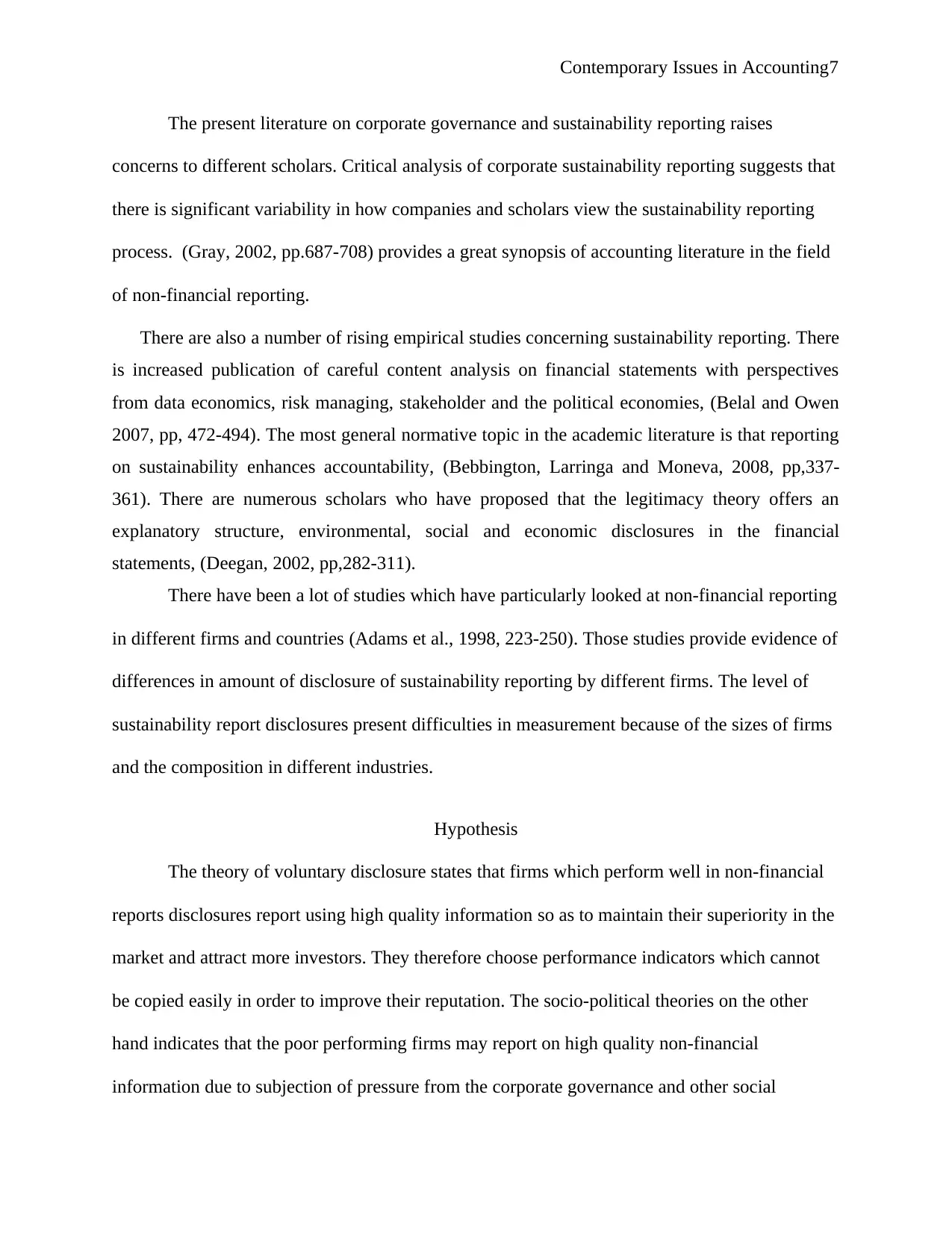
Contemporary Issues in Accounting7
The present literature on corporate governance and sustainability reporting raises
concerns to different scholars. Critical analysis of corporate sustainability reporting suggests that
there is significant variability in how companies and scholars view the sustainability reporting
process. (Gray, 2002, pp.687-708) provides a great synopsis of accounting literature in the field
of non-financial reporting.
There are also a number of rising empirical studies concerning sustainability reporting. There
is increased publication of careful content analysis on financial statements with perspectives
from data economics, risk managing, stakeholder and the political economies, (Belal and Owen
2007, pp, 472-494). The most general normative topic in the academic literature is that reporting
on sustainability enhances accountability, (Bebbington, Larringa and Moneva, 2008, pp,337-
361). There are numerous scholars who have proposed that the legitimacy theory offers an
explanatory structure, environmental, social and economic disclosures in the financial
statements, (Deegan, 2002, pp,282-311).
There have been a lot of studies which have particularly looked at non-financial reporting
in different firms and countries (Adams et al., 1998, 223-250). Those studies provide evidence of
differences in amount of disclosure of sustainability reporting by different firms. The level of
sustainability report disclosures present difficulties in measurement because of the sizes of firms
and the composition in different industries.
Hypothesis
The theory of voluntary disclosure states that firms which perform well in non-financial
reports disclosures report using high quality information so as to maintain their superiority in the
market and attract more investors. They therefore choose performance indicators which cannot
be copied easily in order to improve their reputation. The socio-political theories on the other
hand indicates that the poor performing firms may report on high quality non-financial
information due to subjection of pressure from the corporate governance and other social
The present literature on corporate governance and sustainability reporting raises
concerns to different scholars. Critical analysis of corporate sustainability reporting suggests that
there is significant variability in how companies and scholars view the sustainability reporting
process. (Gray, 2002, pp.687-708) provides a great synopsis of accounting literature in the field
of non-financial reporting.
There are also a number of rising empirical studies concerning sustainability reporting. There
is increased publication of careful content analysis on financial statements with perspectives
from data economics, risk managing, stakeholder and the political economies, (Belal and Owen
2007, pp, 472-494). The most general normative topic in the academic literature is that reporting
on sustainability enhances accountability, (Bebbington, Larringa and Moneva, 2008, pp,337-
361). There are numerous scholars who have proposed that the legitimacy theory offers an
explanatory structure, environmental, social and economic disclosures in the financial
statements, (Deegan, 2002, pp,282-311).
There have been a lot of studies which have particularly looked at non-financial reporting
in different firms and countries (Adams et al., 1998, 223-250). Those studies provide evidence of
differences in amount of disclosure of sustainability reporting by different firms. The level of
sustainability report disclosures present difficulties in measurement because of the sizes of firms
and the composition in different industries.
Hypothesis
The theory of voluntary disclosure states that firms which perform well in non-financial
reports disclosures report using high quality information so as to maintain their superiority in the
market and attract more investors. They therefore choose performance indicators which cannot
be copied easily in order to improve their reputation. The socio-political theories on the other
hand indicates that the poor performing firms may report on high quality non-financial
information due to subjection of pressure from the corporate governance and other social
Paraphrase This Document
Need a fresh take? Get an instant paraphrase of this document with our AI Paraphraser
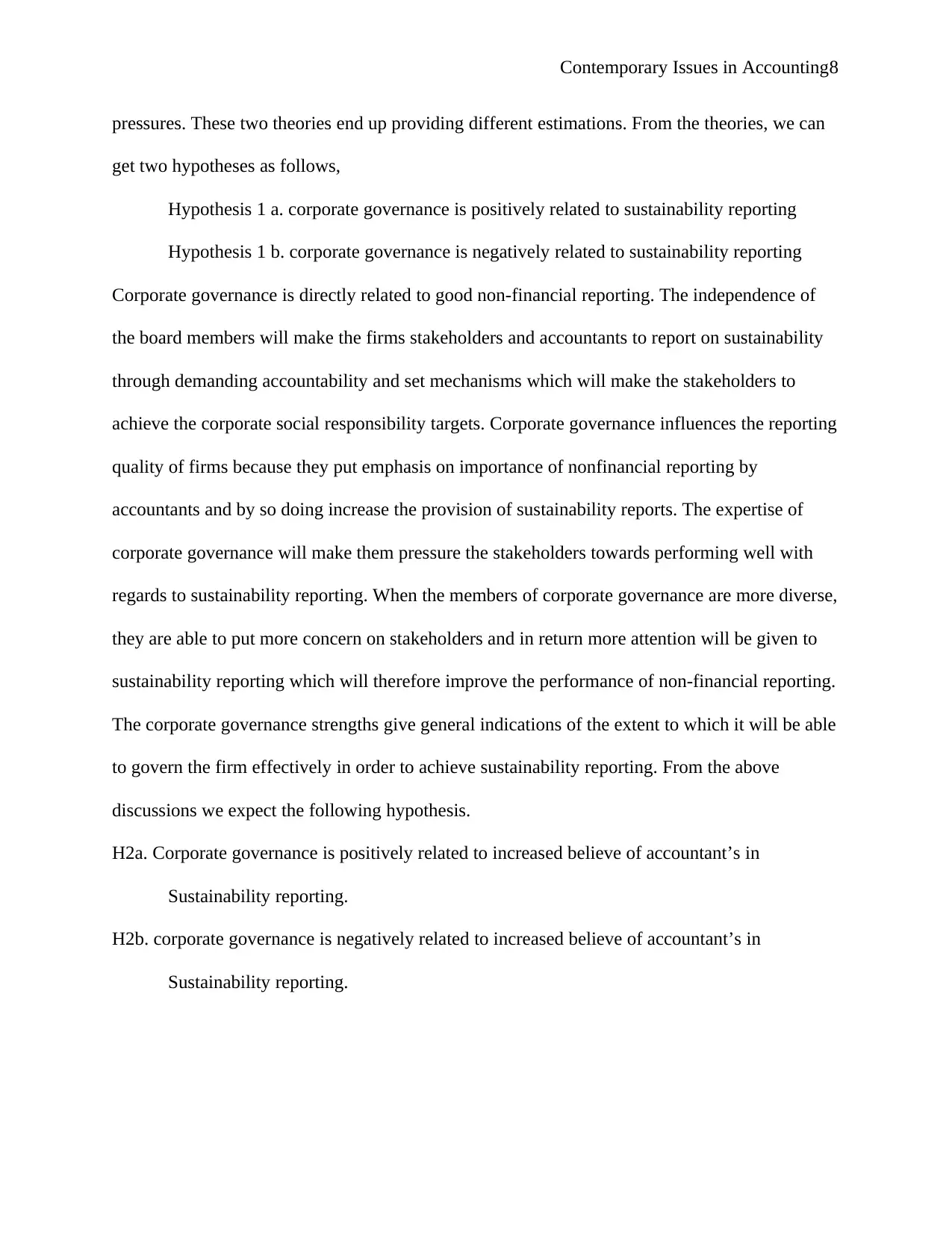
Contemporary Issues in Accounting8
pressures. These two theories end up providing different estimations. From the theories, we can
get two hypotheses as follows,
Hypothesis 1 a. corporate governance is positively related to sustainability reporting
Hypothesis 1 b. corporate governance is negatively related to sustainability reporting
Corporate governance is directly related to good non-financial reporting. The independence of
the board members will make the firms stakeholders and accountants to report on sustainability
through demanding accountability and set mechanisms which will make the stakeholders to
achieve the corporate social responsibility targets. Corporate governance influences the reporting
quality of firms because they put emphasis on importance of nonfinancial reporting by
accountants and by so doing increase the provision of sustainability reports. The expertise of
corporate governance will make them pressure the stakeholders towards performing well with
regards to sustainability reporting. When the members of corporate governance are more diverse,
they are able to put more concern on stakeholders and in return more attention will be given to
sustainability reporting which will therefore improve the performance of non-financial reporting.
The corporate governance strengths give general indications of the extent to which it will be able
to govern the firm effectively in order to achieve sustainability reporting. From the above
discussions we expect the following hypothesis.
H2a. Corporate governance is positively related to increased believe of accountant’s in
Sustainability reporting.
H2b. corporate governance is negatively related to increased believe of accountant’s in
Sustainability reporting.
pressures. These two theories end up providing different estimations. From the theories, we can
get two hypotheses as follows,
Hypothesis 1 a. corporate governance is positively related to sustainability reporting
Hypothesis 1 b. corporate governance is negatively related to sustainability reporting
Corporate governance is directly related to good non-financial reporting. The independence of
the board members will make the firms stakeholders and accountants to report on sustainability
through demanding accountability and set mechanisms which will make the stakeholders to
achieve the corporate social responsibility targets. Corporate governance influences the reporting
quality of firms because they put emphasis on importance of nonfinancial reporting by
accountants and by so doing increase the provision of sustainability reports. The expertise of
corporate governance will make them pressure the stakeholders towards performing well with
regards to sustainability reporting. When the members of corporate governance are more diverse,
they are able to put more concern on stakeholders and in return more attention will be given to
sustainability reporting which will therefore improve the performance of non-financial reporting.
The corporate governance strengths give general indications of the extent to which it will be able
to govern the firm effectively in order to achieve sustainability reporting. From the above
discussions we expect the following hypothesis.
H2a. Corporate governance is positively related to increased believe of accountant’s in
Sustainability reporting.
H2b. corporate governance is negatively related to increased believe of accountant’s in
Sustainability reporting.
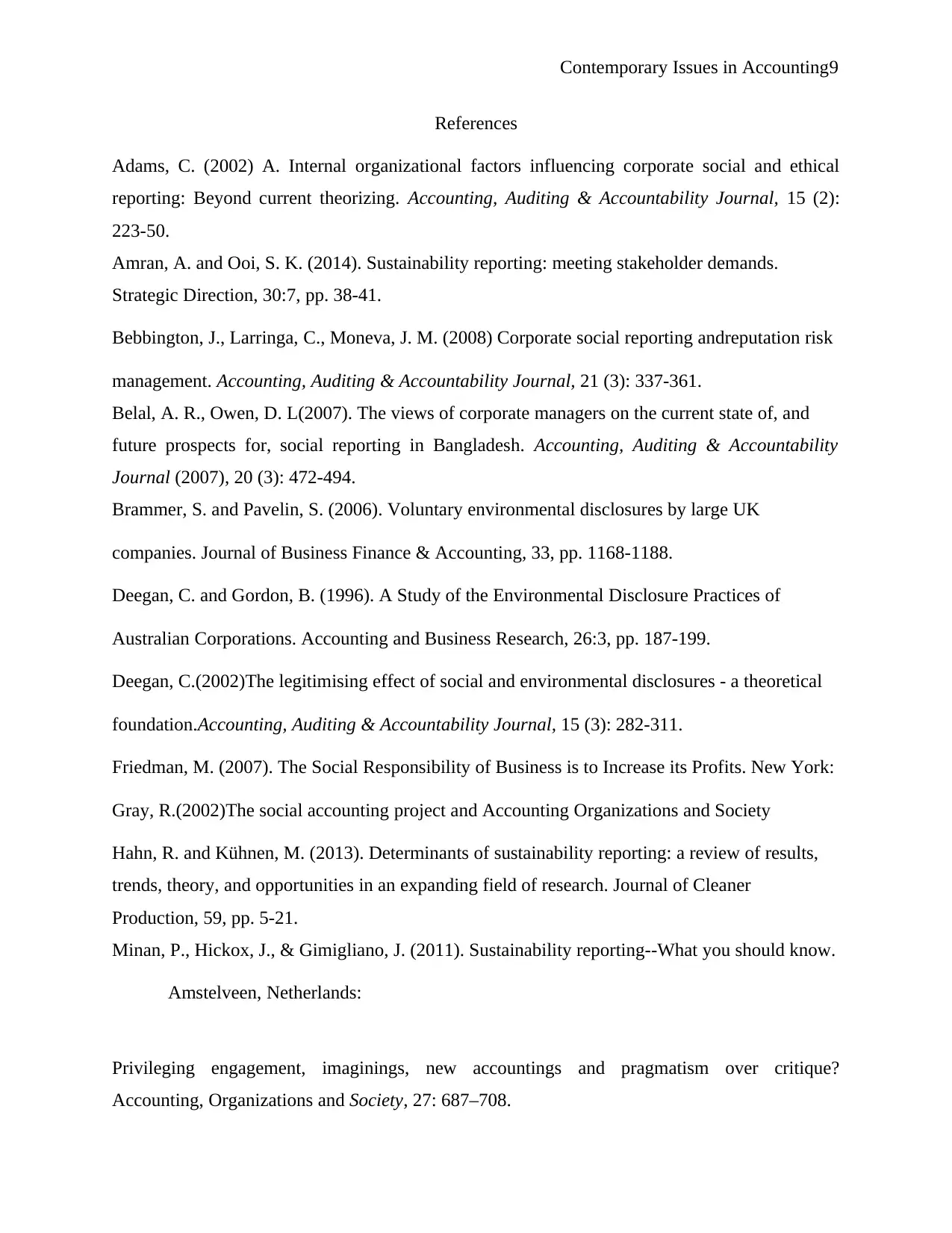
Contemporary Issues in Accounting9
References
Adams, C. (2002) A. Internal organizational factors influencing corporate social and ethical
reporting: Beyond current theorizing. Accounting, Auditing & Accountability Journal, 15 (2):
223-50.
Amran, A. and Ooi, S. K. (2014). Sustainability reporting: meeting stakeholder demands.
Strategic Direction, 30:7, pp. 38-41.
Bebbington, J., Larringa, C., Moneva, J. M. (2008) Corporate social reporting andreputation risk
management. Accounting, Auditing & Accountability Journal, 21 (3): 337-361.
Belal, A. R., Owen, D. L(2007). The views of corporate managers on the current state of, and
future prospects for, social reporting in Bangladesh. Accounting, Auditing & Accountability
Journal (2007), 20 (3): 472-494.
Brammer, S. and Pavelin, S. (2006). Voluntary environmental disclosures by large UK
companies. Journal of Business Finance & Accounting, 33, pp. 1168-1188.
Deegan, C. and Gordon, B. (1996). A Study of the Environmental Disclosure Practices of
Australian Corporations. Accounting and Business Research, 26:3, pp. 187-199.
Deegan, C.(2002)The legitimising effect of social and environmental disclosures - a theoretical
foundation.Accounting, Auditing & Accountability Journal, 15 (3): 282-311.
Friedman, M. (2007). The Social Responsibility of Business is to Increase its Profits. New York:
Gray, R.(2002)The social accounting project and Accounting Organizations and Society
Hahn, R. and Kühnen, M. (2013). Determinants of sustainability reporting: a review of results,
trends, theory, and opportunities in an expanding field of research. Journal of Cleaner
Production, 59, pp. 5-21.
Minan, P., Hickox, J., & Gimigliano, J. (2011). Sustainability reporting--What you should know.
Amstelveen, Netherlands:
Privileging engagement, imaginings, new accountings and pragmatism over critique?
Accounting, Organizations and Society, 27: 687–708.
References
Adams, C. (2002) A. Internal organizational factors influencing corporate social and ethical
reporting: Beyond current theorizing. Accounting, Auditing & Accountability Journal, 15 (2):
223-50.
Amran, A. and Ooi, S. K. (2014). Sustainability reporting: meeting stakeholder demands.
Strategic Direction, 30:7, pp. 38-41.
Bebbington, J., Larringa, C., Moneva, J. M. (2008) Corporate social reporting andreputation risk
management. Accounting, Auditing & Accountability Journal, 21 (3): 337-361.
Belal, A. R., Owen, D. L(2007). The views of corporate managers on the current state of, and
future prospects for, social reporting in Bangladesh. Accounting, Auditing & Accountability
Journal (2007), 20 (3): 472-494.
Brammer, S. and Pavelin, S. (2006). Voluntary environmental disclosures by large UK
companies. Journal of Business Finance & Accounting, 33, pp. 1168-1188.
Deegan, C. and Gordon, B. (1996). A Study of the Environmental Disclosure Practices of
Australian Corporations. Accounting and Business Research, 26:3, pp. 187-199.
Deegan, C.(2002)The legitimising effect of social and environmental disclosures - a theoretical
foundation.Accounting, Auditing & Accountability Journal, 15 (3): 282-311.
Friedman, M. (2007). The Social Responsibility of Business is to Increase its Profits. New York:
Gray, R.(2002)The social accounting project and Accounting Organizations and Society
Hahn, R. and Kühnen, M. (2013). Determinants of sustainability reporting: a review of results,
trends, theory, and opportunities in an expanding field of research. Journal of Cleaner
Production, 59, pp. 5-21.
Minan, P., Hickox, J., & Gimigliano, J. (2011). Sustainability reporting--What you should know.
Amstelveen, Netherlands:
Privileging engagement, imaginings, new accountings and pragmatism over critique?
Accounting, Organizations and Society, 27: 687–708.
⊘ This is a preview!⊘
Do you want full access?
Subscribe today to unlock all pages.

Trusted by 1+ million students worldwide
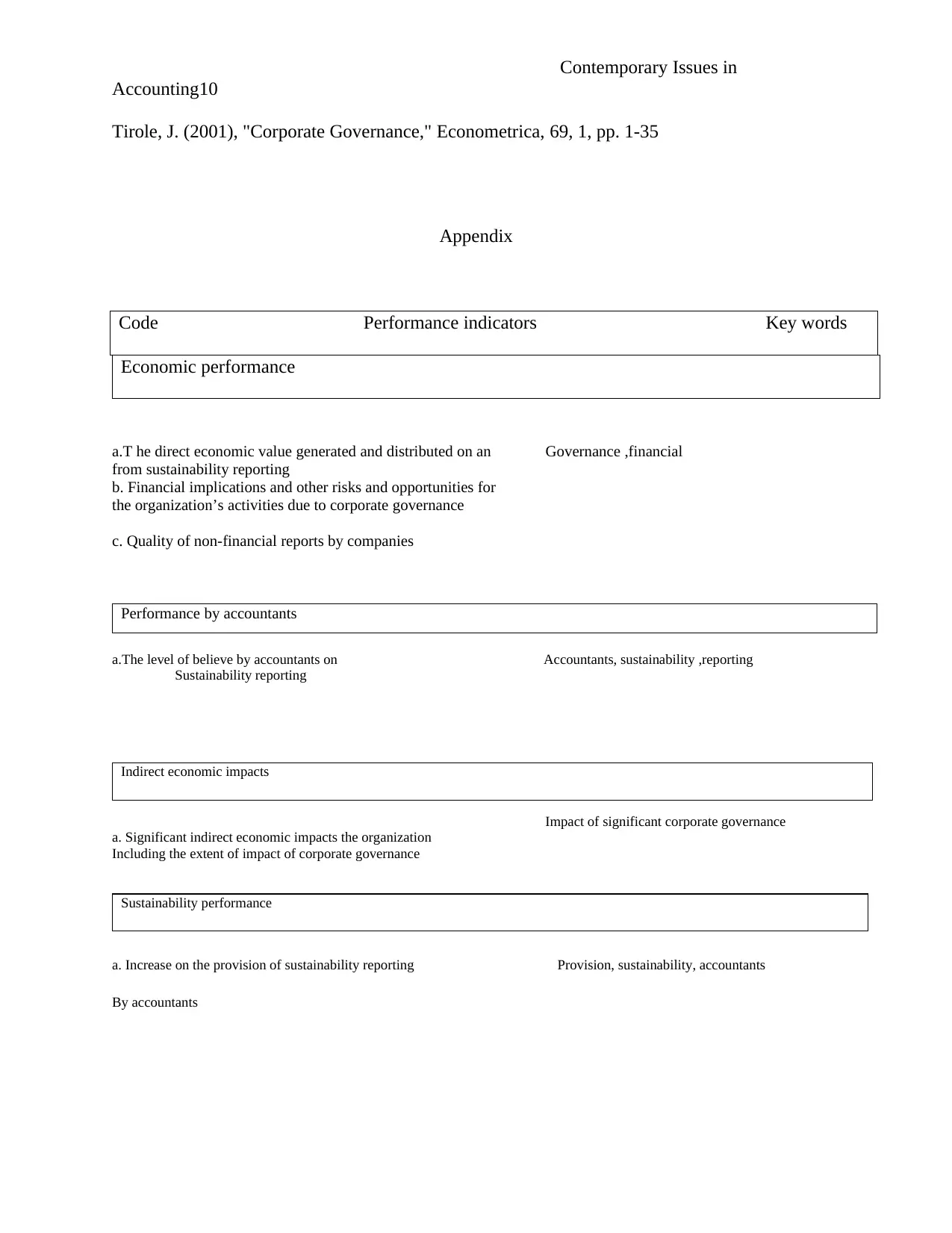
Contemporary Issues in
Accounting10
Tirole, J. (2001), "Corporate Governance," Econometrica, 69, 1, pp. 1-35
Appendix
Code Performance indicators Key words
Economic performance
a.T he direct economic value generated and distributed on an Governance ,financial
from sustainability reporting
b. Financial implications and other risks and opportunities for
the organization’s activities due to corporate governance
c. Quality of non-financial reports by companies
Performance by accountants
a.The level of believe by accountants on Accountants, sustainability ,reporting
Sustainability reporting
Indirect economic impacts
Impact of significant corporate governance
a. Significant indirect economic impacts the organization
Including the extent of impact of corporate governance
Sustainability performance
a. Increase on the provision of sustainability reporting Provision, sustainability, accountants
By accountants
Accounting10
Tirole, J. (2001), "Corporate Governance," Econometrica, 69, 1, pp. 1-35
Appendix
Code Performance indicators Key words
Economic performance
a.T he direct economic value generated and distributed on an Governance ,financial
from sustainability reporting
b. Financial implications and other risks and opportunities for
the organization’s activities due to corporate governance
c. Quality of non-financial reports by companies
Performance by accountants
a.The level of believe by accountants on Accountants, sustainability ,reporting
Sustainability reporting
Indirect economic impacts
Impact of significant corporate governance
a. Significant indirect economic impacts the organization
Including the extent of impact of corporate governance
Sustainability performance
a. Increase on the provision of sustainability reporting Provision, sustainability, accountants
By accountants
1 out of 10
Related Documents
Your All-in-One AI-Powered Toolkit for Academic Success.
+13062052269
info@desklib.com
Available 24*7 on WhatsApp / Email
![[object Object]](/_next/static/media/star-bottom.7253800d.svg)
Unlock your academic potential
Copyright © 2020–2026 A2Z Services. All Rights Reserved. Developed and managed by ZUCOL.





